I Finally Splurged on Caraway Pans—Here’s Why I Wish I Hadn’t
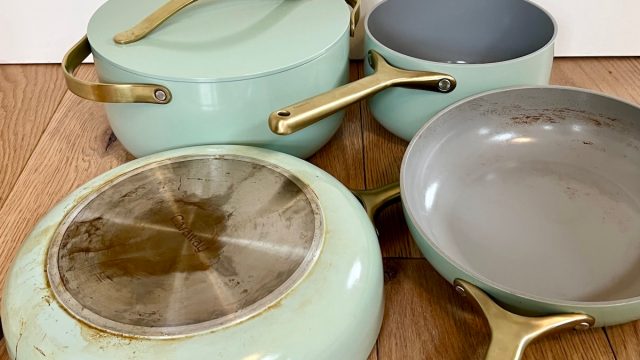
I’d gone out to dinner with friends, which meant my husband was on his own. He promised me he wouldn’t just eat a bag of potato chips in front of the TV. So, I was delighted to learn he had cooked himself healthy chicken burgers—that is, until I looked at the pan he made them in. My beautiful, new, seafoam green Caraway pan was covered in burn marks that no amount of soaking and scrubbing could get rid of. Of course, I demanded to know what my husband did to ruin the $145 pan. “I just cooked them normally,” he swore. And much to my chagrin, he was right. I quickly had a similar experience that made me wish I had never splurged on Caraway pans. Here are my thoughts on the popular non-toxic cookware.
RELATED: 6 Cheaper Dupes for the Our Place Always Pan.
Caraway had been splashed on my Instagram feed for years.
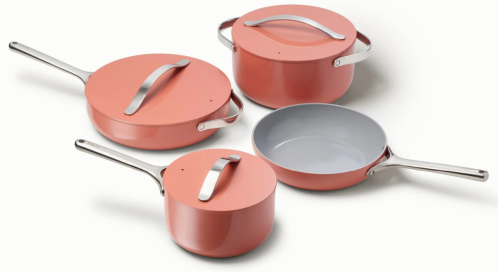
I’d been seeing Caraway cookware promoted on my Instagram feed for several years, and each time, the lovely seafoam green pots and pans caught my eye. (Take one look at my house and you’ll understand my obsession with this color.) However, I could never justify the $545 price tag for the cookware set, which includes a 10.5″ fry pan, 4.5-quart sauté pan, 3-quart saucepan, 6.5-quart Dutch oven, and the corresponding lids.
Caraway’s social media ads also highlight that the pans are non-toxic. And after convincing myself that I was ingesting Teflon after cooking on my cheap, banged-up pans, this also spoke to me. (On a serious note, as I get older, I do seek out less harmful products, especially since I have a family history of cancer.)
So I finally decided to splurge.
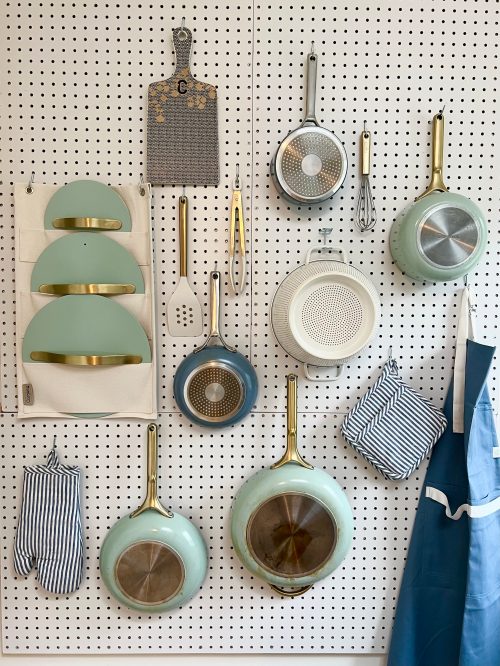
This past September, my husband and I bought our first home, a fact that Meta seemed to know all too well. So, when I got yet another Instagram advertisement for Caraway, this one including a nearly $200-off promotion, I jumped on it. I ordered the set in what the company calls “silt green,” complete with gold handles.
To sweeten the pot (pun intended), our new home’s kitchen came with a peg board perfect for displaying these lovely pots and pans. “A real home needs real pots and pans,” I told myself. And when the Caraway box arrived and was so heavy that I could barely get it up the stairs, I felt like I’d truly entered adulthood.
RELATED: The 7 Best Kitchen Items to Buy at Walmart, Retail Experts Say.
But my Caraway fantasies were soon shattered.
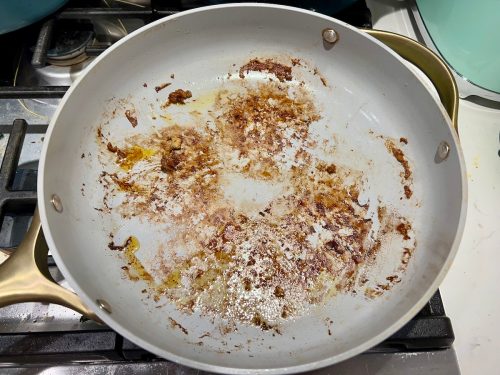
The first red flag about my new Caraway pans was raised after my husband cooked his chicken burgers. I tried everything to get the pan to come clean, eventually resorting to white vinegar, baking soda, and a lot of elbow grease—no exaggeration, I spent about an hour scrubbing (and no, I didn’t use the abrasive side of the sponge).
While this did get some of the staining out, it didn’t clean the pan entirely. It also scared my husband into never cooking on these pans again (I’m still debating if this is a good thing or a bad thing).
My Caraway pans are stained on the bottom, too, which I realize is common from the heat of a gas stove, but it dampens my pegboard style nonetheless.
It’s now nearly impossible to cook in these pans.
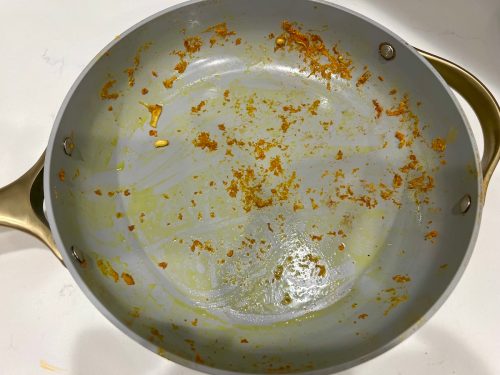
More disappointing than the aesthetics though, each time I cook in the fry pan or the larger sauté pan, I find that the food sticks. This happens less so when I’m continuously moving the food around, say when I’m sautéeing vegetables, and mostly when I’m making something that has to brown, like the aforementioned chicken burgers or a piece of salmon.
For example, just last night, I made this popular Turmeric-Black Pepper Chicken With Asparagus dish from The New York Times. I coated the bite-size chicken pieces in seasoning and flour, heated a couple tablespoons of olive oil in my Caraway pan, and began browning the chicken. Almost immediately, every piece of chicken was stuck to the pan and the turmeric/flour was burning on the bottom.
Inevitably, I found myself adding more and more oil to combat the sticking. This is counterintuitive since Caraway touts that their non-stick cookware only requires a small bit of oil. It’s also not so healthy.
I soon gave up and transferred the chicken to my no-fail cast iron pan, while my Caraway pan soaked in the sink awaiting another round of scrubbing.
RELATED: 7 Vintage Kitchen Items That Could Make You Rich, Experts Say.
TikTok is how I realized I wasn’t alone in my experience.
I was inspired to write this article after seeing a TikTok video about how ceramic pans break down. Previously, I just assumed it was something I’d done wrong, but it seems to be a common issue.
In response to @sydneygrant’s query about why her Caraway pans were totally black after a year and a half, chef and culinary instructor Kelly Scott explained.
“I have cooked on every single pan imaginable,” she said in her video. “I have seen literally everyone have issues with pans like these… I hate to be the bearer of bad news here, but ceramic pans are not good to cook on.”
First, Scott says that ceramic pans have a much shorter lifespan than other materials: “Every time you heat up a ceramic pan, it naturally releases a little bit from whatever’s underneath the ceramic, and that means that coating is wearing out… which then, unfortunately, makes it stick.”
She also shares that since ceramic is a delicate material (“more delicate than Teflon”), it scratches very easily, which causes the coating to break down.
Finally, Scott’s opinion is that pans such as these are “just not well made.” She explains that a “good pan” will usually have stainless steel or hard anodized core with the lining on top of that. “That’s because these are stronger, they don’t warp, they’ll hold together better. But a lot of these ceramic pans are just non-anodized aluminum… so it’s gonna warp anytime it’s heated up,” she adds.
And, as Scott points out, once you’re at the point where you’re cooking directly on aluminum, is the pan really non-toxic?
RELATED: 5 Best KitchenAid Mixer Dupes for Less, Retail Experts Say.
So, what’s next in my cookware journey?
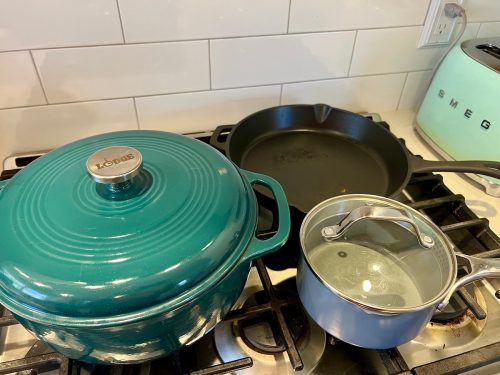
In full disclosure, I should say that I cook nearly every day. And, as my husband will attest, I’m not the cleanest or most gentle in the kitchen. But if I’m spending hundreds of dollars on pans, I believe they should be able to withstand some of my more adventurous cooking endeavors.
I should also be clear that the two Caraway pots I bought are in great shape. I use these mostly for boiling water/cooking pasta and making rice.
But given how much I love to cook, I prefer a durable workhorse like a cast-iron pan—I have this $62 one from chef Geoffrey Zakarian’s line and absolutely love it.
I also can’t say enough good things about my Lodge Dutch oven, which is just as good as a Le Creuset in my opinion, but is only $80 on Amazon and often goes on sale.
For the look of Caraway to go on my peg board, Target’s much cheaper Figmint line is a more economical choice for my budget. These ceramic pots and pans come in dusty blue and sage green and look just as beautiful.
Here’s what Caraway had to say.
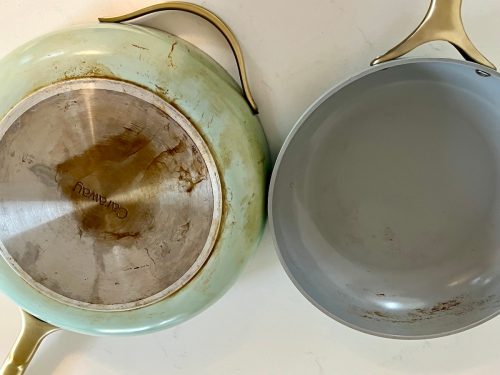
I reached out to Caraway about this story, and they did offer to send me a new set of ceramic pans or an opportunity to try their stainless steel cookware, which I’ll happily be taking them up on.
Caraway also shared the following statement in response to my claims:
“Caraway deliberately excludes harmful chemicals and manufacturing processes commonly used in cookware with lifetime claims… While this ensures a cleaner product, maintaining its longevity necessitates special care, which is outlined in our comprehensive Care & Cleaning Guide… With our recommendations, we anticipate the pans lasting several years.”
We typically find that non-stick failure arises from general wear and tear, oils polymerizing onto the cooking surface after reaching their smoke point, or excessive scratches compromising the pan’s surface. Exterior discoloration can happen, although it is preventable and can be cleaned up with proper care.
We also want to emphasize that in Teflon pans, hard anodization doesn’t necessarily increase durability but aids in coating adhesion. This process involves highly toxic sulfuric acid, contributing to environmental pollution and human health risks. At Caraway, we ultimately believe that eliminating practices like hard anodization is more important than anything else, and as a result, our pieces may require a more non-traditional approach to care and cleaning.”